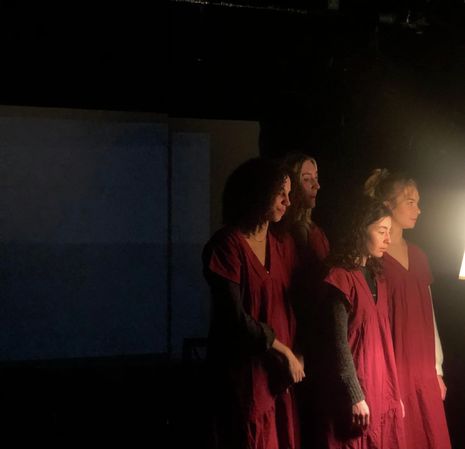The Last of the Pelican Daughters is incisive and wickedly funny
Theatre Editor Stanley Lawson reviews this weeks Corpus mainshow, The Last of the Pelican Daughters

To call The Last of the Pelican Daughters a comedy seems somehow wrong – not because it is not funny (I and the rest of the audience were laughing for much of the play last night) – but because the challenges it poses to how we think about loss, family and responsibility are profound and the foundation of some incredibly emotionally tense acting from the cast. The weaving together of the comedy and the pathos of the play only seems incredible now I have sat down to write this review. Whilst watching it felt seamless; a testament to the direction of Josh Bailey and AD Jack Ward. The subtle strength of this production, beyond the brilliant comedy, was the quality of the performance by the four central characters, the Pelican Sisters (Charli Cowgill, Gaia Mondadori, Imani Thompson and India Lewis). All four actors held the emotional momentum of both the group and their own individual characters wonderfully – it was a rare treat to see so many central characters to a play played quite so well.
“The subtle strength of this production, beyond the brilliant comedy, was the quality of the performance”
The cast worked fantastically as an ensemble, playing off each other for the conflict which drives so much of the play – both between the sisters and the ‘outsiders’ (the various partners and male relations) and within the quartet of the sisters themselves. Each sister had her dramatic moment, commanding the stage with her emotion, temporarily crowding the others out; Mondadori’s heart breaking delivery of Storm’s monologue about what caring for their recently deceased mother had done to her and her future was exactly the kind of emotional flashpoint which beautifully counterpointed the comedy of the play. In the same vein, Sage’s (Thompson) impassioned defence of the John Lennon ‘Imagine’, 1960s, hippy inspired life of her mother and it’s continuing relevance was a poignant collision of personal and political – that the optimism of the moment that ‘Imagine’ encapsulates feels almost as dead as the mother (who’s presence looms large in the play and almost every cast member gets a turn playing in snippets of analepsis) who had embodied it.
“one of the biggest laughs of the night was for a particularly well-timed exhale by Alberman”
However, the finest moments of the play were when the sisters were more connected – either in argument or in comfort. These interactions and moments of dialogue filled in the gap between each sister; the play early on establishes each of the sisters, but then takes it’s time filling in the relationship between each one, and their relationships to the other characters. With this space to really open the emotional tensions and soft spots, the actors play marvellously with the feeling woven between their characters. The other characters were neither just external enemies or comic relief, which they could have become, but an integral part of the conflict and healing of the narrative. Derren (Jack Medlin) as the dull ‘Swindon’ suburbanite, and his complex relationship with the eldest daughter Joy (played fantastically by Cowgill) and Luke (Joe Harrington), entering late, challenged the tone set by the sisters of the family throughout – his delinquency and aggressive masculine front added another excellent layer of depth to the family dynamic. Though he was not just comic relief, Sol Alberman’s performance as Dodo the American boyfriend of Maya (Lewis) was incredibly funny, elevating the lines with a physicality and inflection that had the audience in stiches. Alberman’s performance, and indeed the whole play, was an excellent reminder that some of the best comedy in theatre comes from the very smallest things made ridiculous – one of the biggest laughs of the night was for a particularly well-timed exhale by Alberman.
Throughout the piece there were sequences of movement, dance and changes in the physical pace on stage – often joyful dances, cranking the energy up, but sometimes they were fights slowed to a ‘frame by frame’ speed, or even a still tableaux. Variable in form, these interruptions to the naturalistic flow worked wonders for the play, pulling out an emotional strand for the audience and throwing feeling into sharp relief. Working with the projections and the division into chapter, the pacing was tightly controlled by Bailey, allowing the actors to create the chaos on stage that is so integral to the play.
The Last of The Pelican Daughters is a wonderfully funny, tense, original piece of theatre. Cleverly directed without every losing sight of the heart of the play, and featuring a remarkable concentration of exquisite acting, it certainly is not a light-hearted evening at the theatre but one I would definitely recommend.
 News / Report suggests Cambridge the hardest place to get a first in the country23 January 2026
News / Report suggests Cambridge the hardest place to get a first in the country23 January 2026 Arts / Exploring Cambridge’s modernist architecture20 January 2026
Arts / Exploring Cambridge’s modernist architecture20 January 2026 Comment / The (Dys)functions of student politics at Cambridge19 January 2026
Comment / The (Dys)functions of student politics at Cambridge19 January 2026 Theatre / The ETG’s Comedy of Errors is flawless21 January 2026
Theatre / The ETG’s Comedy of Errors is flawless21 January 2026 News / Write for Varsity this Lent16 January 2026
News / Write for Varsity this Lent16 January 2026










